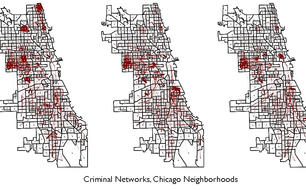
Our research team investigates disparities in neighborhood violence in Chicago. In this line of research, we examine how the concentration of violence within urban areas is maintained and magnified by the diffusion of violence from one place to the next, with particular attention to city-level criminal networks in Chicago. These studies provide two main contributions to the literature on urban crime: first, we describe the way that social connections between individual criminal offenders form a city-wide network that spans neighborhoods throughout the city. Second, we show how this city-wide network contributes to the diffusion of crime, potentially amplifying neighborhood inequality in rates of violence. Overall, our results indicate that employing social network methods improves our ability to model neighborhood differences in violent crime, when compared to previous approaches that do not use network data.
The Yale High Performance Computing Clusters have been essential resource for completing analyses for recent projects. In particular, we have used the High Performance Computing Clusters for computationally intensive methods, including social network analysis and Exponential Random Graph Models (ERGMs).
- Andrew Papachristos and Sara Bastomski. ”Connected in Crime: The Enduring Effect of Neighborhood Networks on the Spatial Patterning of Violence.” Manuscript available upon request.
- Sara Bastomski, Noli Brazil, and Andrew Papachristos. ”Neighborhood Networks, Structural Embeddedness, and Violent Crime in Chicago.” Manuscript available upon request.
- Yanick Charette and Andrew Papachristos. “The Network Dynamics of Co-Offending Careers.” Manuscript available upon request.
- Yanick Charette and Andrew Papachristos. “The Friendship Paradox Can Get You Killed: The Predictive Value of Network Centrality on Gunshot Victimization.” Manuscript available upon request.